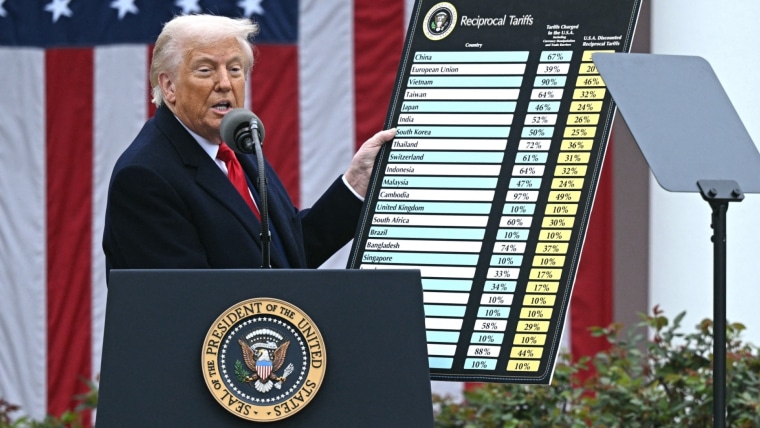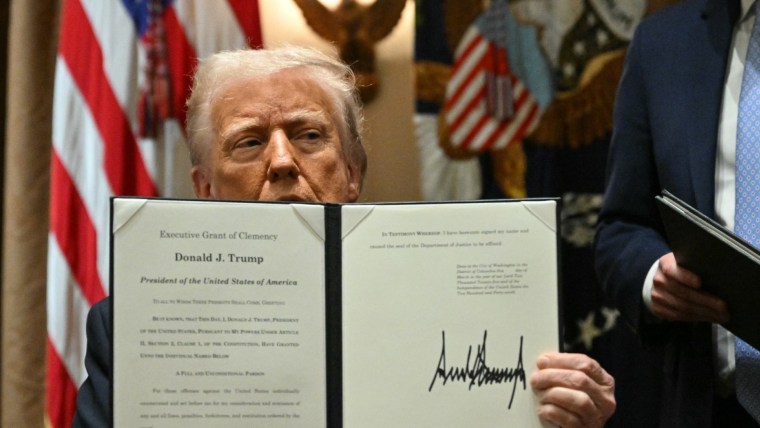This is an adapted excerpt from the May 28 episode of “All In with Chris Hayes.”
Donald Trump is the first felon ever elected president of the United States, and now, months into his second term, he’s handing out “get out of jail free” cards.
In recent days, the president has gone on something of a pardon spree: On Wednesday alone, Trump granted clemency to at least a half-dozen people, including a pardon for John Roland, the former Republican governor of Connecticut, who was convicted in two federal criminal cases; rapper NBA YoungBoy, who was sentenced to nearly two years in prison in a federal gun case; and former 1st Lt. Mark Bashaw, who was court-martialed for disobeying Covid rules.
Last year, you may remember that Trump’s handpicked Supreme Court ruled that almost anything the president does that could be construed as an official act cannot be criminally prosecuted. It was a wild ruling, based on invented doctrine. It was also effectively a pardon from the court.
The court's decision was a wild ruling based on invented doctrine. It was also effectively a pardon.
It appears Trump now wants to reorient the entire federal justice system to extend that same immunity to anyone he deems similarly above the law.
Just consider Trump’s pardon of Paul Walzak, a Florida nursing home executive who pleaded guilty to tax crimes last year, less than two weeks after Trump was elected.
According to The New York Times, Walzak started angling for a pardon from the incoming president almost immediately, submitting a pardon application to Trump right around Inauguration Day. “The application focused not solely on [his] offenses but also on the political activity of his mother, Elizabeth Fago,” the Times reports.
The application noted that Fago had raised millions of dollars for Republican campaigns, including Trump’s. “It also highlighted her connections to an effort to sabotage [Joe Biden’s] 2020 campaign by publicizing the addiction diary of his daughter Ashley Biden — an episode that drew law enforcement scrutiny,” the Times reports.
It would appear that was not enough to sway the president, however. So Walzak’s mother tried a different approach. Last month, Fago was invited to a $1 million-per-person fundraising dinner at Mar-a-Lago that promised face-to-face access to Trump. Less than three weeks after she attended the dinner, Trump signed a full and unconditional pardon for her son.
That pardon means Walzak avoided an 18-month prison sentence. He also no longer has to pay the government more than $4 million in restitution, which sounds like a pretty good return on an investment in a $1 million fundraiser. To be clear, we do not know that the pardon was connected to the fundraiser — maybe it was all a coincidence! — but the timing is awfully suspicious.
The topic of selling pardons was certainly a concern for judges when Trump’s immunity case was before a federal appeals court last year. After one of the judges asked Trump’s attorney John Sauer if a president could sell pardons or military secrets, he replied that while the sale of military secrets “might not be held to be an official act,” that “the sale of pardons is something that has come up historically and was not prosecuted.”
For Trump, it appears the law is not for seeking justice against wealthy tax cheats with well-connected mothers. Nor is it for locking up Trump supporters who stormed the Capitol. No, those people — including the ones who assaulted police officers and the ones convicted of seditious conspiracy — got a full, unconditional pardon on Trump’s very first day.

On his second day, Trump pardoned a man named Ross Ulbricht, the so-called martyr of the Bitcoin movement, who ran the drug trafficking website known as the Silk Road, a marketplace where you could purchase, for instance, fentanyl — which this administration talks so much about wanting to keep outside our borders.
Trump was clear that Ulbricht’s pardon was to honor the Libertarian Movement, “which supported me so strongly.” Incidentally, Ulbricht met with Trump’s buddy Roger Stone earlier this month (another recipient of a presidential pardon). This week, Ulbricht also spoke at a Bitcoin conference, along with Vice President JD Vance and the president’s sons Eric and Don Jr.
It seems that, in Trump’s view, when drug trafficking is facilitated by brown people from foreign countries, it’s a crisis so severe that it requires the U.S. to effectively end due process. But when drug trafficking is facilitated by a clean-cut libertarian guy who looks like a peer of the vice president and his sons, it’s something to be tolerated, if not commended.
We are seeing this story play out over and over again, especially when it comes to what we used to call corruption, or white-collar crime. Especially when it involves the category of people who Trump might have as Mar-a-Lago members.
Like Carlos Watson, the founder of Ozy media, who was sentenced to nearly a decade in prison after being convicted of fraud and aggravated identity theft. In March, Trump commuted his sentence.
Also in March, Trump pardoned three co-founders of the crypto exchange BitMEX after they pleaded guilty last year to a bank secrecy violation.
That same month, Trump pardoned Trevor Milton, founder of an electric vehicle startup, who was sentenced to four years in prison for securities fraud. Milton, along with his wife, also happened to donate nearly $2 million to a Trump re-election fund late last year.
Trump is not acting in good faith. Instead, he has decided that the purpose of the pardon is to protect people who are loyal to him.
Also in March, Trump pardoned Brian Kelsey, a former Tennessee Republican state senator, who pleaded guilty to charges stemming from a campaign finance scheme.
In April, Trump pardoned former Nevada Republican lawmaker Michelle Fiore, a MAGA loyalist who was found guilty on wire fraud charges last year. At trial, prosecutors said she raised $70,000 to build a statue for a fallen police officer and then used some of the money on cosmetic surgery instead.
This week, Trump announced he would pardon Todd and Julie Chrisley, the reality TV stars who were convicted on multiple counts of fraud and tax evasion. He also pardoned Michael Grimm, a former Republican congressman from New York and Newsmax commentator who spent seven months in prison a decade ago after pleading guilty to one count of tax fraud.
But Trump wasn’t done there. On Wednesday, the president said he was open to pardoning the right-wing extremists convicted of a plot to kidnap Michigan’s Democratic Gov. Gretchen Whitmer back in 2020.
The power of presidential pardons and clemency can be a very good thing. In most presidencies in my lifetime, it’s been woefully underused. But Trump is not acting in good faith. Instead, he has decided that the purpose of the pardon is to protect those who are loyal to him or who commit the kind of crimes he thinks are no big deal.

